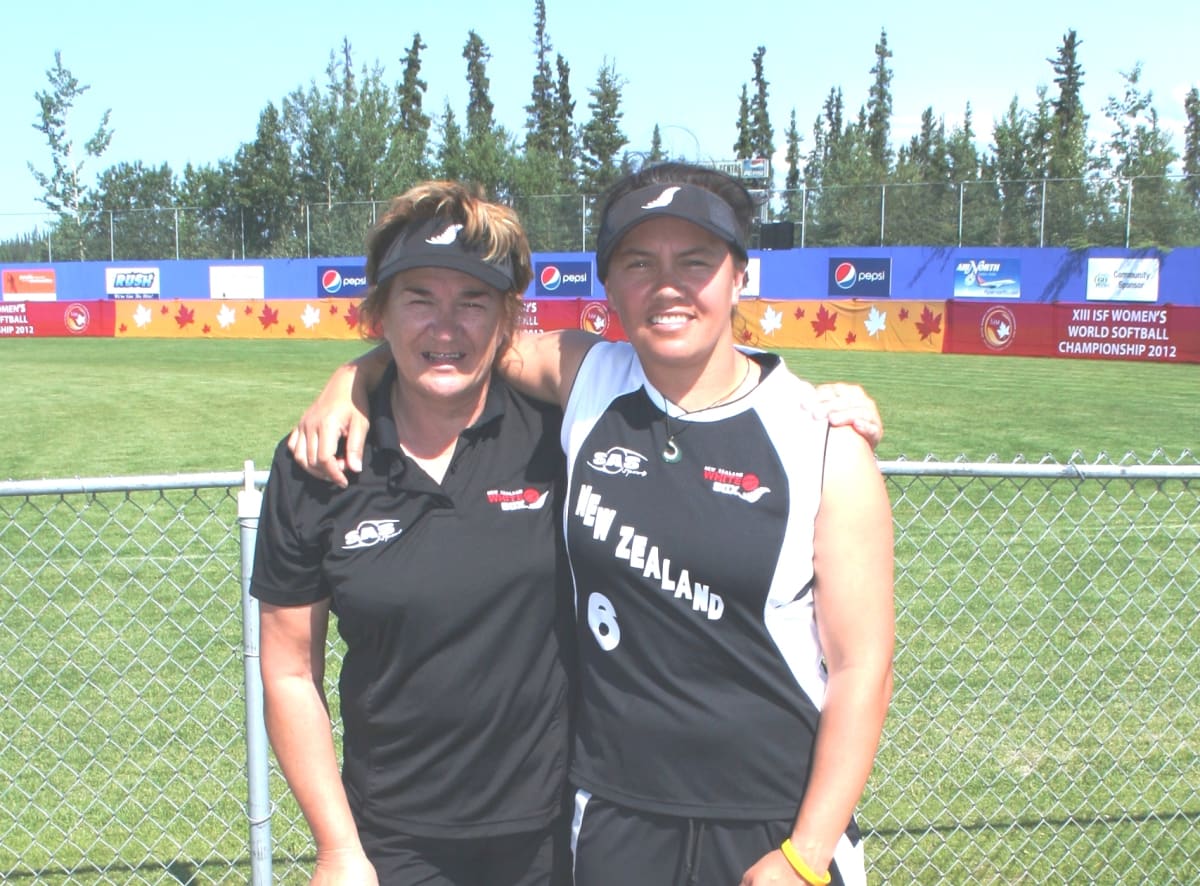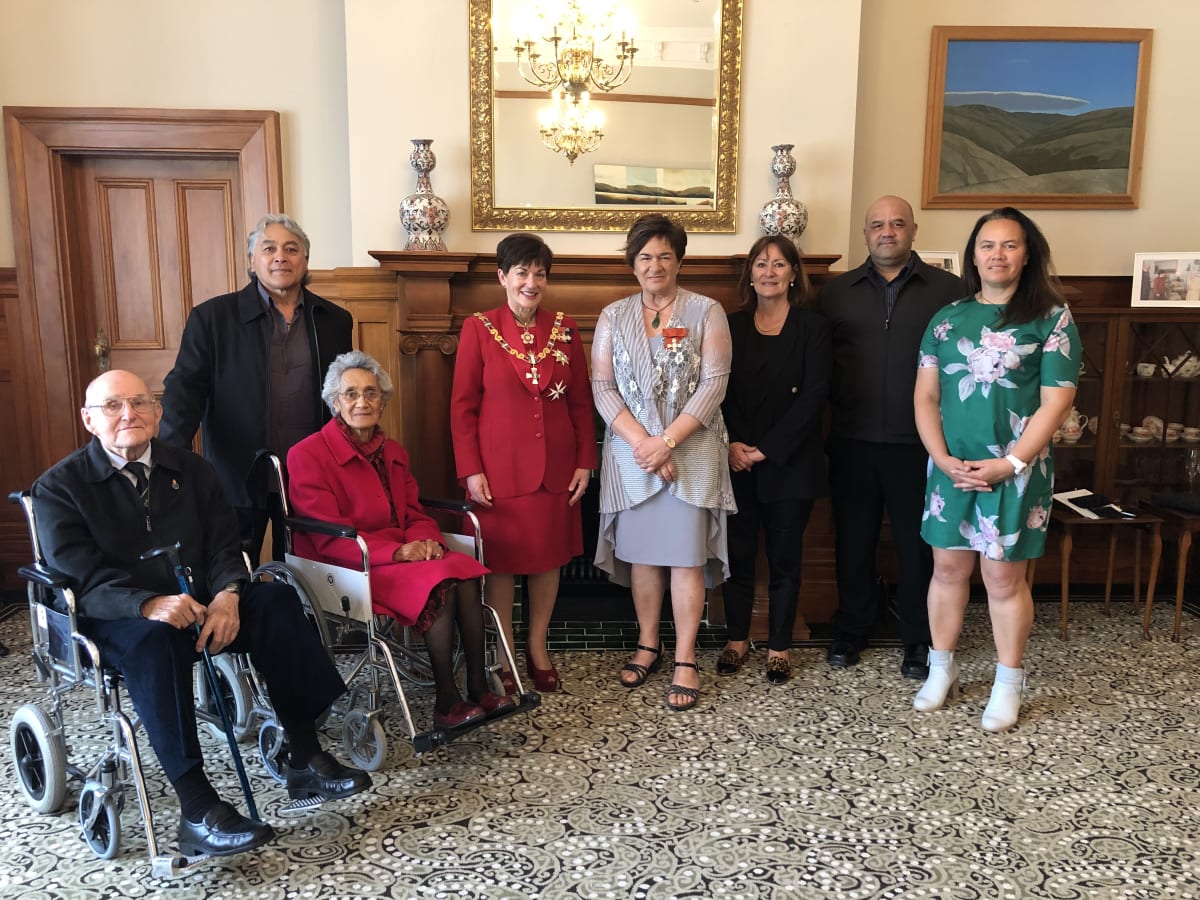
Four decades after leading the White Sox to their only world softball championship victory, Naomi Shaw - one of New Zealand's sporting greats - continues to lead her community, especially through grief during a pandemic.
During her successful career as captain of the White Sox, Naomi Shaw was renowned for bringing people together. Especially as the leader of the only New Zealand team to win a women’s world softball championship back in 1982.
But Shaw wasn’t able to gather people around her immediately after her partner, Matt, died suddenly in hospital during a nationwide Covid lockdown - perhaps one of the hardest things imaginable to bear during those already difficult times.
"What made his passing even more difficult to deal with was in Māoridom, there is a tangi which lasts for three days. Yet there he was, cremated two days later and back home," Shaw says.
Born in the Lower Hutt suburb of Taitā (where she still lives today), and of Ngāti Kahungunu ki te Wairoa and Ngāti Tūwharetoa descent, Shaw clearly recalls the feeling of forlornness and isolation that compounded her loss. "Everything felt so foreign. There was nobody else at home. Just me and his ashes."
After eventually making peace with her grief, Shaw came to recognise there were many others who had experienced similar sorrow and frustration.
"There were so many other cases like me, even in the Hutt region. I just knew we had to do something to bring people together,” the 65-year-old says. So she set about doing it.

Bringing people together. Going back in time, it's what Shaw did so successfully in her decade-long international softball career. But being a leader wasn't always a natural fit for her.
"I didn't really want to be a national captain when I was asked to do it leading into 1982. I was quite shy and introverted," she says with a laugh.
She also discovered the captaincy mantle meant a lot of talking to strangers.
"As for the public speaking side of it, that terrified me,” she says. “The first time I had to do it at a function, I couldn't eat. And I was sweating and all shaky and wobbly. I remember thinking, I don't want to do this."
As an infielder, Shaw had been in the national team since 1978 world championships in El Salvador, where they placed third.
Although when she first wore the national colours, her motivation to make the team wasn’t quite the material of future captaincy.
"I always tell people that the reason I first wanted to play for New Zealand was so I could get to visit Disneyland someday,” says Shaw, has a warm personality and a keen sense of humour that’s laced with a little self-deprecation.
“I guess they saw something in me in 1982, but I couldn't see it. Although I already had had two children by that time, so I had some life experience and they must've thought I had the goods."
Having the goods. It's what people with innate leadership presence have. After Matt's passing, and on hearing of similar lockdown bereavement stories, Shaw set about making a difference. As a sitting Hutt City councillor, she could pull some strings.
"Through my council connections and the funeral home, Gee and Hickton, we established the Isolation Bereavement Support Programme, which is still ongoing, because so is Covid,” Shaw says. “The Hutt City Council provided the funding, and Gee and Hickton assisted with providing support counsellors. We made it an open invitation for anyone who'd been in the same position as I'd been.

"We initially got 20 people joining with their families. We also reached out to many more who didn't want to come. The stories were really, really difficult to hear - and they still are. The stories of bereavement for people are still there.”
Stories like those of Janet and Fred.
"Level Four was definitely the worst time. We had two elderly people in our group, Janet and Fred. I won't forget them. They were both in their late 70s, and they'd both lost their partners after around 60 years together, and couldn't be at a funeral for them,” Shaw says.
“We initially did six two-hour sessions with the group. We talked and did activities and there were a lot of tears. I've never been very touchy-feely, but it certainly had an effect and was very healing, I think, for all who came."
Shaw's heartfelt initiative then became a part of a very important follow-up.
It became part of an Auckland University-led study group, Rāpua Te Mārama, researching the effects of bereavement during Covid. The information will be used to improve health care, hospital policy and tangihanga/funeral planning during pandemic situations.
“They had actually intended doing an exhibition around the country in 2022, featuring interviews with 25 families in those situations and how we might have done things better. But now it may have to be an online exhibition. Covid stills affects us then to this day," says Shaw.
There's no rest for those who lead with initiative; Shaw has another plan she'd like to get her teeth into.
"An ongoing project I have at the moment involves trying to get some type of monument or memorial created, dedicated to families who have been affected by bereavement during Covid so they’re acknowledged and not forgotten,” she says.
“I've already approached Culture and Heritage in the government to see what can be done nationally as well. In the Hutt at least, there’s a very good groundswell of support to do something."

You can't help feeling Shaw will find a way to achieve her goal of a memorial. It's the kind of spirit and drive that took Shaw and her team to their 1982 world softball title in Taiwan. Difficulties are things there to be overcome.
"We were a team that gelled pretty early on, perhaps because we had to face a bit of adversity first in our pre-world championship tour through Indonesia and the Philippines,” she says.
“I remember going through the Philippines and, for whatever reason, the accommodation got split. Some of the group got put up at the mayor's house, which was palatial and beautiful, while the others were taken off to a more squalid part of town and had to stay at a place behind bars, with armed guards. Another accommodation had only one working toilet and shower for all of us."
Tap water was also an issue, bottled water was still something only the wealthy in Europe drank, and Gatorade was the domain of American football teams.
"I remember guzzling down tons of Coke in our pre-game warm-ups because of no water available, and it was so hot." (The final, for example, was played in over 30 degrees Celsius heat).
The only way to overcome was to bond.
"The absolute best thing was we had a group of athletes committed to working together. There were no egos whatsoever. We also had a wonderfully supportive management team. Those things together made us as a team. Not forgetting too that we were highly-skilled," Shaw says.

Of all the factors contributing to their world championship win, there's one that particularly stands out to Shaw. Having Ed Dolejs as the coach was “the masterstroke”.
“Ed was a very technically and tactically skilled coach, but more importantly for me at that time was that he was man of strong family values. I already had two children [Kiri and Whetu], so he understood my life,” she says.
After beating the host nation in round-robin play, the Kiwis met the same opponent in the final. Shaw's recollections are of a tough fight in the 2-0 victory - and not just with the actual opponent.
"There was a lot of political unrest at the time. There was a crowd of 30,000 for the final, but it seemed not all were there for the game itself,” she says. “We realised there were quite a few in attendance who obviously had political agendas. It was a little frightening in some ways. Not to mention there were firecrackers being thrown around."
The White Sox world title victory hasn't been repeated. The entire team is in the New Zealand Sports Hall of Fame.
Shaw, who played her last international in 1986, was part of a three-generational whānau of White Sox representatives.
"As well as myself, my daughter Kiri and granddaughter Denva have played for the national team. And my son-in-law, Craig Wallace, was in the Black Sox. Also, a mokopuna is a national age-grade player,” she says.

In a nice piece of symmetry, Shaw and Kiri both played with Gina Weber.
"Gina was the baby of our 1982 team, at about 19 years old. Years later she was called up to save the day, as it were, at the 2000 Sydney Olympics, where she played with Kiri," Shaw says.
A decade after the 2000 Olympics, Shaw became the national women's coach. She ponders on what was more of a challenge: Captaining or coaching the national team?
“I'd say coaching. When I first coached the White Sox in 2010, female numbers had dropped off and there weren't a lot of elite players to pick from. So really, until I finished in 2014, we had to have a strong development focus. Thankfully in the end it was a lot more competitive,” she says.
"The worst thing ever was having to ring someone to tell them they hadn't made the team, when you knew how much work they had put in. But I learnt a great deal from Ed Dolejs, who originally shoulder-tapped me to help him with the team."
Shaw's father, Jack, has always been a strong influence.
“Dad is 95 years old. He was a founding member of the Saints softball club, which I've now belonged to for 60 years,” she says. “When I got my New Zealand Order of Merit a couple of years ago, easily the best thing was that he got to see it."

Shaw was on the staff of Naenae College for 18 years, where she was head of sport and outdoor education, before becoming national director of coaching at Softball NZ in 2004.
After her White Sox coaching stint ended in 2014, Shaw became a development officer with Softball NZ until 2019, when funding began to fall away. She was then elected to twin roles as a Hutt City councillor and as a board member of the Hutt Valley DHB. Life is busier than ever.
"There's always something going on,” she says. “I've just come off a Zoom call about Covid-related safety with primary schools in the Hutt."
But there's still room for softball. She coaches her club’s U17 girls team and the Hutt Valley U19 women.
"I still have a love for the game and the people I'm surrounded with. I still enjoy going to the ballpark. But I've been very frustrated at times by the politics and agendas of people.
“Such things have led me into becoming a bit of a campaigner for the women’s game, because I do believe it wasn't easy being a female coach. There were a lot of inequities and gender stuff involved over a long period of time with battles that I really shouldn't have had to have.
“There's still enough inequity out there, and it sometimes makes you feel like throwing the towel in. Then again, that's only a small minority and there is a lot of really good, equality-based stuff going on through Sport New Zealand.
“We just need to have voices out in the community to keep advocating."







